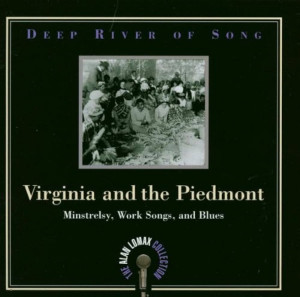 Big Earl Sellar wrote this review.
Big Earl Sellar wrote this review.
Another disc in the Alan Lomax series Deep River of Song, Virginia and the Piedmont has the fitting subtitle of “Minstrelsy, Work Songs, and Blues.” These great archival recordings are just the thing for any music fan, providing the sort of blueprints to help us better understand where today’s music comes from.
Right off the bat, I’ll state my biggest gripe: the songs included on this disc are from three distinct sources. The first group of songs, comprising the bulk of the recordings, is from field trips to a couple of penitentiaries in North Carolina and Virginia, in 1934 and ’36 respectively. The second is from a taped concert by the legendary Sonny Terry and Brownie McGhee in Washington, D.C., in 1942; the third is a concert from 1940 by the Golden Gate Quartet at the Library of Congress. The problem is that, despite the fact that the disc works as a cohesive whole, there is something remiss about including the two concerts by professionals with the recordings of obvious amateurs. The concert records are better performed and are much better recorded. It’s somewhat disconcerting the way the disc flips back and forth between the two related but dissimilar idioms.
Otherwise this disc is great. The breadth of talent presented, both amateur and professional, is simply phenomenal. We get to hear a very young Sonny Terry, in full falsetto glory, blowing that great blues rural harp of his. Brownie McGhee is unfortunately rather quiet on these recordings but adds to the proceedings nonetheless. Their scorching version of “John Henry” is alone worth the price of this disc; coupled with their other two tracks, it ups the disc’s desirability considerably. The Golden Gate Quartet, aided here by Josh White, get in a couple of great harmony songs, despite the fact (according to an included introduction) that half the group is ill. Their version of “Old Dan Tucker,” which opens this disc, breathes much life into a now hackneyed old folk song.
Which leaves us with the field recordings… The Lomaxes (here aided by Harold Spivacke) have left us with a remarkable legacy of music, most of which would have otherwise been long lost to obscurity. Here, they present the listener with one Jimmie Strothers, a blind banjoist incarcerated at the State Farm, in Lynn, Virginia. This is one of those almost mystical Lomax finds. Guessed to be middle-aged, he embodies the Piedmont sound: the music of African-Americans from the mid 1880s to 1920 or so, played in a then modern style. With a steady, powerful voice, the six songs included, all recorded on June 14, 1936, constitute the high point of the disc. With a slightly ornate frailing style, Strothers sings old work songs and blues with the same intensity as Son House or Charlie Patton were currently performing. The liner notes claim that another six songs from this, his only recording, exist; I’d love it if Rounder would collect them together as a stand-alone disc. Another remarkable artist who never got the break he deserved (funny how things never change).
The rest of the recordings are quite good, too. Blind Joe is another stand-out; his bluesy “When I Lie Down Last Night” is as good as anything that was commercially released during that period. Ezra Lewis also gets a couple of great a capella numbers in. Actually, there’re no real weak tracks on this disc, surprising given the limited number of recording dates included.
The sound quality, as mentioned earlier, varies greatly. The field recordings have a great deal of surface noise and are generally slightly clipped as well (Strothers’ tracks are better). The concert tracks, by comparison, are almost pristine, marred only by the primitiveness of the recording equipment. There are a few too many of the recorded “out-tros” that Lomax Sr. used to track his recordings. The disc wouldn’t suffer with the editing of his stumbling over names. The usual thorough liner notes and lyrics are present, including Spivacke’s (later Lomax’s boss at the Library) great personal notes over the “discovery” of Strothers.
My only other worry about Virginia and the Piedmont is about how many more of these discs Rounder will undertake. Given the literal years of recordings John and Alan Lomax conducted, and the consistent quality of the performers, the Deep River of Song series threatens to run into the thousands of volumes. And let me tell you, that is one series I would definitely want to own in its entirety. Again, my hat’s off to Rounder for gracing us with these (re)issues from the Library of Congress.
(Rounder, 2000)
